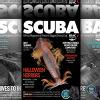
A lost weight nearly spells disaster for Dive Leader Colin Jaycocks, who has to leave his buddy in trouble, but wise medical advice saves the day.
A good friend, who is an experienced rebreather diver and myself, an experienced twinset diver, were set to dive the wreck of the Citrine off the Cornish coast. This was to be our second dive together that day, after diving a deeper site at Vase Reef, on the Manacles, in the morning. It was fine weather, there was little swell and the underwater visibility reached five metres. What could go wrong? Dropping down a shot to 23m we watched the spread of wreckage emerge from the depths and spent a while lazily swimming around enjoying the abundant fish life and the fact that we could see it all.
After 20 minutes or so we came across a port to starboard swim-through that looked inviting. It wasn’t cramped, but did have several changes of depth and direction to navigate debris and what looked like a broken drive shaft. I watched my buddy pass through and exit, so I set out to follow him. A few twists and turns later, including a short head-down section to pass underneath an obstruction, and I was drifting slowly out of a wide exit among a shoal of fish, enjoying a lovely moment.
I looked up see my buddy waiting close to the superstructure above, but he was staring intently at his instruments. My intention was to go up to join him and check that he was okay. Floating gently up, I applied the brakes but I didn’t stop. I dumped all the air from my drysuit and checked that my BCD was empty, but still continued to rise, passing my buddy, who was beckoning me to join him with some urgency now. Ironically, I was frantically signalling to him to come to me, to help to halt my ascent.
A quick feel around my middle revealed that I had lost one of the lead-shot pouches from my weight harness, and the resulting halving of my weight was accounting for my lack of control.
I firstly made myself as upright as possible, with my arm and cuff dump stretched above me, wiggling to ensure that all the air was out of my suit. Then I tried spreading myself out like a sky diver wondering if drag would slow me down, and I emptied my lungs.
A final wave to my buddy and I concentrated on trying to rise as slowly as I could and not panic. In truth I was very anxious about what was about to happen. According to my dive computer, it took me four minutes to surface from 22m, which I was, perversely, quite proud of, but at no point did I stop ascending and some urgent signalling for help to an excellent crew had me on the boat lift in moments. I explained my problem and the loss of my buddy and an oxygen mask was immediately clamped to my face. My buddy surfaced soon after, on his open-circuit bailout, and explained that his frantic signalling was because his computer was telling him that he was breathing oxygen levels that meant he should have been unconscious, a just reason for the focused equipment checking that I had seen.
Taking medical advice via the coastguard, after 40 minutes of symptom-free oxygen first aid I was advised to adopt a vigilant, wait-and-see approach. I had an anxious 24 hours of self-assessment during which every ache or surface itch seemed to be impending decompression illness.
My weight pouch was returned to me by a dive pair surfacing after me and I have added quick-release clips to replace the worn Velcro that didn’t hold it in. My buddy’s oxygen sensor has been replaced and, following a short layoff while my dive computer and I regained our poise, he and I have enjoyed several more dives together.
Read more about the Incident Analysis on Taking Control: Twin Troubles
Article source - SCUBA magazine issue 63

 Author: SCUBA | Posted 16 Mar 2017
Author: SCUBA | Posted 16 Mar 2017


